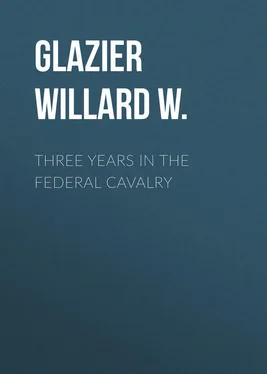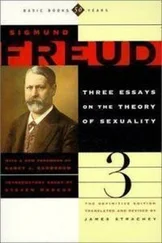Willard Glazier - Three Years in the Federal Cavalry
Здесь есть возможность читать онлайн «Willard Glazier - Three Years in the Federal Cavalry» — ознакомительный отрывок электронной книги совершенно бесплатно, а после прочтения отрывка купить полную версию. В некоторых случаях можно слушать аудио, скачать через торрент в формате fb2 и присутствует краткое содержание. Жанр: История, foreign_antique, foreign_prose, short_story, на английском языке. Описание произведения, (предисловие) а так же отзывы посетителей доступны на портале библиотеки ЛибКат.
- Название:Three Years in the Federal Cavalry
- Автор:
- Жанр:
- Год:неизвестен
- ISBN:нет данных
- Рейтинг книги:4 / 5. Голосов: 1
-
Избранное:Добавить в избранное
- Отзывы:
-
Ваша оценка:
- 80
- 1
- 2
- 3
- 4
- 5
Three Years in the Federal Cavalry: краткое содержание, описание и аннотация
Предлагаем к чтению аннотацию, описание, краткое содержание или предисловие (зависит от того, что написал сам автор книги «Three Years in the Federal Cavalry»). Если вы не нашли необходимую информацию о книге — напишите в комментариях, мы постараемся отыскать её.
Three Years in the Federal Cavalry — читать онлайн ознакомительный отрывок
Ниже представлен текст книги, разбитый по страницам. Система сохранения места последней прочитанной страницы, позволяет с удобством читать онлайн бесплатно книгу «Three Years in the Federal Cavalry», без необходимости каждый раз заново искать на чём Вы остановились. Поставьте закладку, и сможете в любой момент перейти на страницу, на которой закончили чтение.
Интервал:
Закладка:
These hospitals are all much more quiet than one would naturally suppose. How calmly the brave boys endure the wounds they have received in defence of their beloved country! Only now and then can be heard a subdued sob, or a dying groan; while those who are fully conscious, though suffering excruciating pain, are either engaged in silent prayer or meditation, or reading a Testament or a last letter from loved ones, and patiently awaiting their turn with the surgeon or the nurse.
In the most available places tables have been spread for the purpose of amputations. We cannot approach them, with their heaps of mangled hands and feet, of shattered bones and yet quivering flesh, without a shudder. A man must need the highest style of heroism willingly to drag himself or be borne by others to one of these tables, to undergo the processes of the amputating blade. But thanks be to modern skill in surgery, and to the discoverer of chloroform; for by these the operations are performed quickly and without the least sensation, until the poor brave awakes with the painful consciousness of the loss of limbs, which no artificer can fully replace. Thus the skill displayed and the care taken greatly mitigate the horrors of battle. Men here are wounded in every conceivable manner, from the crowns of their heads to the soles of their feet, while some are most fearfully torn by shells. It had been thought that men shot through the lungs or entrails were past cure, yet several of the former have been saved, and a few of the latter. Indeed, it would seem as though modern science was measuring nearly up to the age of miracles.
We found that a large force of cavalry was concentrating at Culpepper, awaiting new developments. Reconnoissances are of frequent occurrence, and all of them reveal that the enemy is in motion, concentrating on our front. Our picket lines are made doubly strong, and the utmost vigilance is enjoined. Scouts and spies are on the rampage, and more or less excitement prevails everywhere.
August 16. – To-day a small detachment of cavalry under Colonel Broadhead, of the First Michigan Cavalry, was despatched on a scout in the direction of Louisa Court House. Having penetrated to within the enemy's lines, and not far from the Court House, they made a swift descent upon a suspicious looking house, which proved to be General Stuart's headquarters. The general barely escaped through a back door, as it were "by the skin of his teeth," leaving a part of his wardrobe behind him. His belt fell into our hands, and several very important despatches from General Lee. Stuart's adjutant-general was found concealed in the house and captured. General Pope, in his official reports, speaks of this affair as follows:
"The cavalry expedition sent out on the sixteenth in the direction of Louisa Court House, captured the adjutant-general of General Stuart, and was very near capturing that officer himself. Among the papers taken was an autograph letter of General Robert E. Lee to General Stuart, dated Gordonsville, August fifteenth, which made manifest to me the disposition and force of the enemy and their determination to overwhelm the army under my command before it could be reënforced by any portion of the Army of the Potomac."
Had it not been for the timely discovery of this Rebel order, General Pope's army, only a handful to the multitudes which were gathering against him from the defences of Richmond, would have been flanked and probably annihilated. Assured, however, that reënforcements from McClellan's army could certainly reach him before long, General Pope held his advanced position to the last, our pickets guarding the fords of the Rapidan. On the eighteenth, the entire force of cavalry relieved the infantry pickets, and evident preparations were being made for a retreat. On the day following a sharp skirmish took place with Rebel cavalry which appeared across the narrow, rapid river. In this engagement Captain Charles Walters, of the Harris Light, was killed, and his remains were interred at midnight just as orders were received to retreat on the road to Culpepper.
The cavalry under General Bayard is acting as rear guard to our retreating columns. Stuart's cavalry, with whom we are engaged at almost every step, is vanguard of the Rebel army, which is advancing as rapidly as possible. The prospect before us is exceedingly dark. Nothing is more discouraging to a soldier than to be compelled to retreat, especially under a general whose first order on assuming command contained the following utterances:
"Meantime, I desire you to dismiss from your minds certain phrases which I am sorry to find much in vogue among you.
"I hear constantly of taking strong positions and holding them – of lines of retreat and of bases of supplies. Let us discard such ideas.
"The strongest position a soldier should desire to occupy is one from which he can most easily advance against the enemy.
"Let us study the probable lines of retreat of our opponents, and leave our own to take care of themselves. Let us look before, and not behind. Success and glory are in the advance. Disaster and shame lurk in the rear."
We all felt that the moment we begin to turn our backs to the enemy, that moment we acknowledge ourselves either outgeneraled or whipped, a thing most disheartening, and to which pride never easily condescends. Our only hope was based on early reënforcements. Should these fail us we saw nothing but defeat and disaster in our path.
August 20. – While our cavalry forces were feeding their horses on the large plains near Brandy Station, about six o'clock this morning, a heavy column of Stuart's cavalry was discovered, approaching from the direction of Culpepper. Kilpatrick was ordered to attack and check this advance, which he did in a spirited manner. The Harris Light added fresh laurels to its already famous record, and made Brandy Station memorable in the annals of cavalry conflicts. Stuart's advance was not only retarded, but diverted; and it was made our business to watch closely his future movements.
On the twenty-first we reached Freeman's Ford, on the Rappahannock, which we picketed, preventing the enemy from effecting a crossing. As the fords of the river were generally heavily guarded up to this point, the enemy kept moving up the stream toward our right, evidently designing to make a flank movement upon us.
On the twenty-second a notable cavalry engagement, with light artillery, took place at Waterloo Bridge. During this fight a Rebel shell took effect in our ranks, killing instantly the three horses ridden by the three officers of the same company, dismounting the braves very unceremoniously, but injuring no one seriously. Through the darkness of the night following, Stuart, with about fifteen hundred picked cavalry, effected a crossing of the river, and after making quite a détour via Warrenton, came down unperceived through the intense darkness and the falling rain upon General Pope's headquarters near Catlett's Station. He captured the general's field quartermaster and many important documents, made great havoc among the guards, horses, and wagons, and finally escaped, without injury to himself, with about three hundred prisoners, and considerable private baggage taken from the train. His victory was indeed a cheap one, but we all felt its disgrace, which the darkness to some extent explained, but did not fully excuse.
August 23. – A severe contest occurred to-day at Sulphur Springs. The enemy is pressing us hard at every crossing of the river, and continues to move towards our right. Skirmishing occurs at nearly every hour of the day and night, occasioning more or less loss of life. Yesterday in a skirmish led by General Sigel, who had crossed the river, General Bohlen was killed, and our forces driven back to the north side of the river. While this manœuvring was going on along the Rappahannock, General Lee had despatched Stonewall Jackson, to pass around our right, which he did by crossing about four miles above Waterloo, and, on the twenty-fifth, he struck our forces at Bristoe Station, where a severe contest took place, the losses in killed and wounded being heavy on both sides. But the enemy was successful in taking possession of the railroad; and in the evening a portion of Stuart's cavalry, strengthened by two regiments of infantry, advanced to Manassas Junction, where they surprised and charged our guards, capturing many prisoners, also ten locomotives, seven trains loaded with immense quantities of stores, horses, tents, and eight cannon. They destroyed what they could not take away. The Rebel General Ewell, having followed closely in the track of Jackson, also came upon the railroad in rear of General Pope's army.
Читать дальшеИнтервал:
Закладка:
Похожие книги на «Three Years in the Federal Cavalry»
Представляем Вашему вниманию похожие книги на «Three Years in the Federal Cavalry» списком для выбора. Мы отобрали схожую по названию и смыслу литературу в надежде предоставить читателям больше вариантов отыскать новые, интересные, ещё непрочитанные произведения.
Обсуждение, отзывы о книге «Three Years in the Federal Cavalry» и просто собственные мнения читателей. Оставьте ваши комментарии, напишите, что Вы думаете о произведении, его смысле или главных героях. Укажите что конкретно понравилось, а что нет, и почему Вы так считаете.












